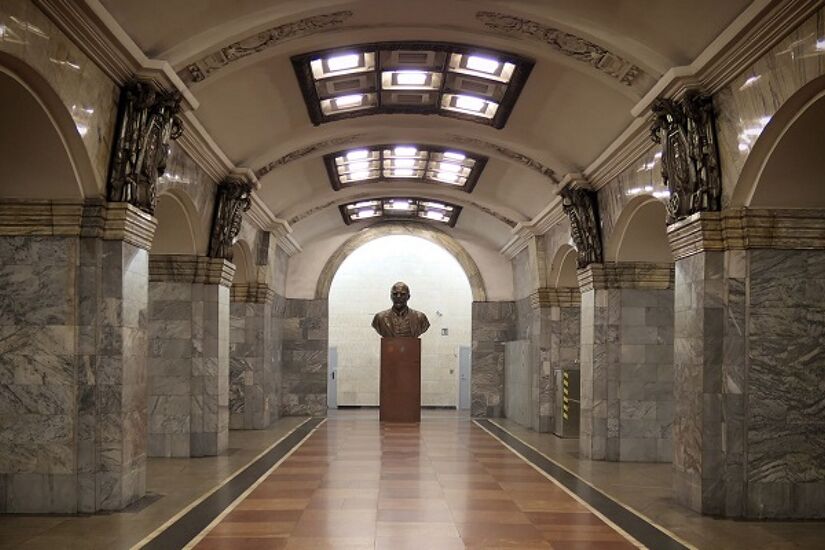World Cup Postcard from underground

Credit: Macdara Ferris (ETPhotos)
Macdara Ferris reports from St Petersburg
Saint Petersburg is a city full of amazing history, architecture and museums. The historic heart of the city is on the UNESCO World Heritage list while the Hermitage Museum is regarded as one of the finest museums in the world.
So besides from attending the Nigeria (see here) and Argentina pre-match press conferences, what is a reporter to do on a Monday when many of the city’s museums are closed?
Well I spent Monday morning riding around on the metro. It wasn’t quite trainspotting but more metro station-spotting, and it was wonderful.
The World Cup media guide notes that “for the avoidance of doubt, a media accreditation pass is not a sign of a social status" but it does open up a few doors including free transport in Russia – between cities where matches are being held and in each of the host cities across the whole tournament.
With that pass and a separate match ticket application, I can get a seat in the press box (or overflow area as I wrote about in a previous postcard here).
However all tourists who travelled to the World Cup get free transport with the Fan ID they were required to get before travelling.
It acted as a free visa into the country (the normal visa costs €86 from the Russian embassy in Rathgar for Irish citizens) and allowed access to free trains between the host cities, as well as the free public transport in the host city on match day.
The St. Petersburg metro opened in 1955 and the stations on line one through the city centre are sightseeing destinations in their own right.
They have some gorgeous ornate features like stain glass windows, marble columns, mosaics and, unsurprisingly in the city once called Leningrad, there are plenty of appearances of Vladimir Illyich Lenin.
Scenes from the St. Petersburg underground #metropic.twitter.com/3EoFyRdFGX
— Macdara Ferris (@macdarabueller) June 25, 2018
Typically the tunnels are between 70 and 80 meters below ground to avoid the difficult soil conditions at shallower levels, making it, on average depth, the deepest underground system in the world.
The Admiralty Station is the deepest of the 69 stations, taking three minutes to descend just the first escalator and another minute on the second taking commuters 86m below ground. Some people choose to run down these escalators, while I’m quite happy to hang onto the handrail!
There is a wonderful mosaic above the escalators depicting Peter the Great leading the Russian fleet. Kirovsky Zavod Station has a bust of Lenin looming at one end of the platform, while in Naravskaya there are carvings of miners, engineers, and sailors on the platform columns.
Among the 16,000 staff employed on the metro are guards that sit at the bottom of each escalator watching CCTV screens of passengers and making occasional announcements over the PA.
A suicide bomb on the metro last year killed 16 people and so most stations have extra airport style security screening for luggage. The x-ray guy and I should really be on first name terms at this stage and he must be bored at seeing my laptop, notepad and assorted electronic cables for computer, phone and camera.
Ahead of the World Cup, the metro was extended the right to Zenit’s stadium – Novokrestovskaya station – and beyond to serve the new Gazprom skyscraper. This now avoids a 1.5km walk to the ground as the new station is right at the west entrance to the stadium, leaving a useful legacy after the World Cup.
At this time of year the metro run pretty much through the night – important for a World Cup host and for a city which raises 13 bridges along the Neva river across the early hours of the day to allow freight ships through the city and out into the Gulf of Finland.
In June up here on the 60th parallel, it doesn’t get fully dark. They call this time of the year ‘white nights’ with sunrise as early as 3.30am. Over the weekend to celebrate the longest day of the year, there was a spectacular post-midnight firework display as part of Scarlet Sails festival.
Brazilian captain Thiago Silva spoke about his team not being used to the bright nights when they played here last week but mainly they’d been warned to “turn off the ipad and iphone to help fall asleep.”
Brazil left it late in that match, scoring twice in injury time to beat Costa Rica. On Tuesday night their South American neighbours Argentina play in the St. Petersburg Stadium even more desperate for points than Brazil were.
Piece from earlier #NGA press conference - No mercy from Nigeria who look to retire Messi #ARG#worldcuphttps://t.co/sKlNWyEfeqpic.twitter.com/5udlDq0vFP
— Macdara Ferris (@macdarabueller) June 25, 2018
There is the potential nightmare scenario for Argentina of going out in the group stages. A defeat to Nigeria would leave their World Cup hopes buried underground six feet under. An Argentinian early exit could well be the content for Tuesday’s postcard from St. Petersburg.

